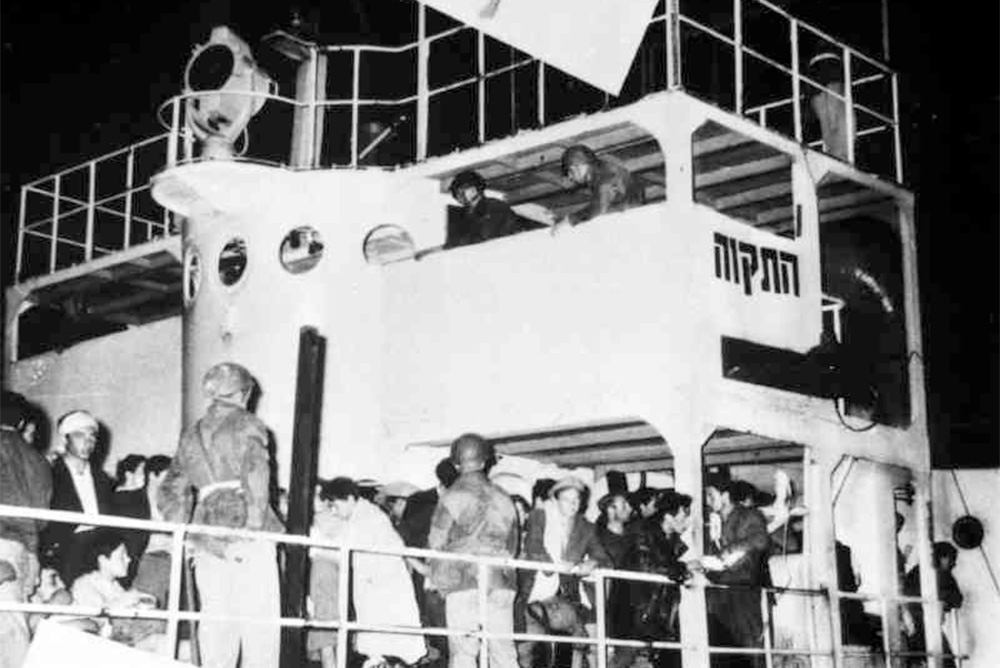
Of course, no Hebrew newspaper reported on the departure of a ship from Genoa, Italy on May 8, 1947, carrying 1,414 refugees who hoped to secretly escape the British blockade and reach Israel's shores. It was only with the discovery of the ship in the middle of the sea by a British patrol plane that Israel came to know of its existence. The ship was given the name 'Hatikva,’ Hebrew for ‘The Hope.’
On the 76th anniversary of the ship's departure, some of the last of its ma’apilim (Jews who illegally immigrated to Israel under the British mandate) gathered together with dozens of family members for a celebratory conference in honor of the ship and the post-war rescue operation as a whole. The celebration was held in Tel Aviv this May at Beit HaPalmach- the museum of the Jewish fighting force which helped bring thousands of Jewish refugees from Europe to Israel in the 1940s despite tight immigration restrictions imposed by the British Mandate. The guest of honor at the event was Mori Greenfeld, 96, an American Jew who was recruited at the time as a volunteer sailor by the Pal-Yam (the naval platoon of the Palmach). He served on the ship as a second officer under the ship's commander Israel Rosenbaum (who later Hebraicized his last name as Rotem), and captain Sidney Yellin.
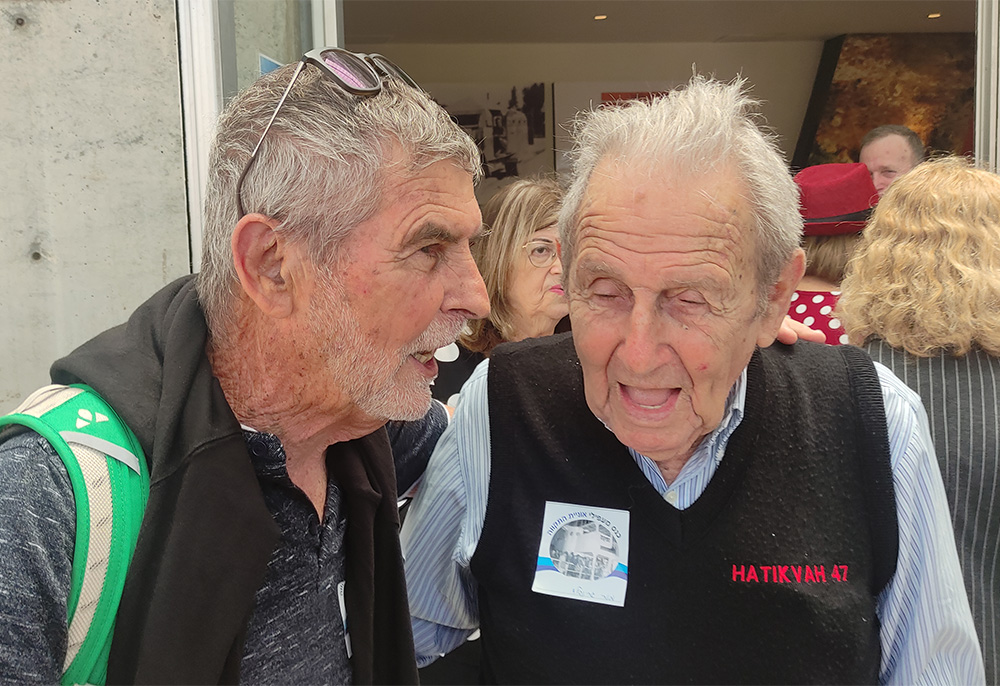
"We saw lights on the beach. More and more lights along the beach were appearing, and we realized they were trucks. The trucks were carrying Holocaust survivors. Throughout the night people would descend from the trucks, get on rubber boats, and enter the ship. This was the first time I met my people," Greenfeld said in a video shown at the conference. "The immigrants didn’t understand who we were and what we were doing there. Are you Americans? I knew Yiddish from home and could converse with them. It was a harrowing experience. Each of them told of a 'different holocaust.' It had a profound effect on me. Of course we knew about the six million murdered – but it doesn't mean anything until you start talking to someone who was there. I felt very close to them."
‘Hatikva’ was an old ship that was not meant to cross oceans or carry so many people. It was built in 1897, and before being recruited for this expedition, it was used by the American Navy in the Spanish-American War in 1898, and later in the First World War to locate submarines on the East Coast.

Later it was used for many years as a merchant ship to transport bananas under the name 'Trade Winds.' Significant preparatory work was required in order to bring it to Europe, so a team of American volunteer sailors was recruited, including Greenfeld. Greenfeld has dedicated his life to the commemoration of approximately 250 American volunteers who helped the immigration project and brought more than 32,000 immigrants to Israel – about 45% of all immigrants from 1945-1948.
"When they told me a year ago that they wanted to hold a 'Hatikva' conference, I thought it was crazy," Greenfeld said on stage. "Who is still alive? Who will come? But here, the nation of Israel still lives. It is very exciting to be here 76 years later."
Nadav Weintraub, the son of Sonny Weintraub, who was also a volunteer on the ship, told his father’s story at the conference.
"My father enlisted at the age of 17 in the American Navy, fought in the War of Independence in 1948, and then served for many years in the Israeli Merchant Navy," Weintraub said. "But the part of his life spent facilitating aliyah (Jewish immigration to Israel) and working on the ship ‘Hatikva’ was a great source of pride for him. I would like to believe that he is watching this conference from above with satisfaction."
"I was 14 years old when I was on the ship," Rachel Har Shalom, 90, told Davar. "My family was deported to Siberia and Uzbekistan. We traveled a long way to Poland, and from there to Italy and the ship." She arrived on the ship with her mother and brother, and with a group of young Jews who had been training to join a kibbutz.
"I remember everything. Literally everything. We were on the ship for two weeks, and it was very difficult. Bunks upon bunks, we were like sardines, crowded and dirty. Until we got close to the shores of Israel, we were still able to go outside a little to breathe air, but as soon as we got close, and the English planes started flying over us, we had to stay in the belly of the ship the whole time. The food was all canned. I remember getting seasick and throwing up. I even fainted. Fresh water was lacking and we got it on a ration; those who wanted to bathe only had sea water.
"I remember the planes and the British destroyers that approached us, one from each side," she said. "They started threatening us. On the ship we trained young men and women to fight face-to-face with sticks, and to throw back the gas grenades that the British threw at us. We threw everything we had at the British – mainly cans. We were prepared in advance so that each of us would have a towel wet with water to protect us from the smoke.
"Despite all the difficulty, we could accept the suffering because we knew it was the last stop. We were filled with hope after leaving Europe. It gave us strength." They didn't know yet that they would be deported to Cyprus, where Rachel Har Shalom would be detained for another 14 months.
"I remember that we approached Haifa at sunset, after the surrender to the British. All the refugees got on board, stood there and cried. It's a moment that still haunts me to this day. This feeling after all the hardships and journeys. Like Moses standing in front of the Promised Land and unable to enter it."
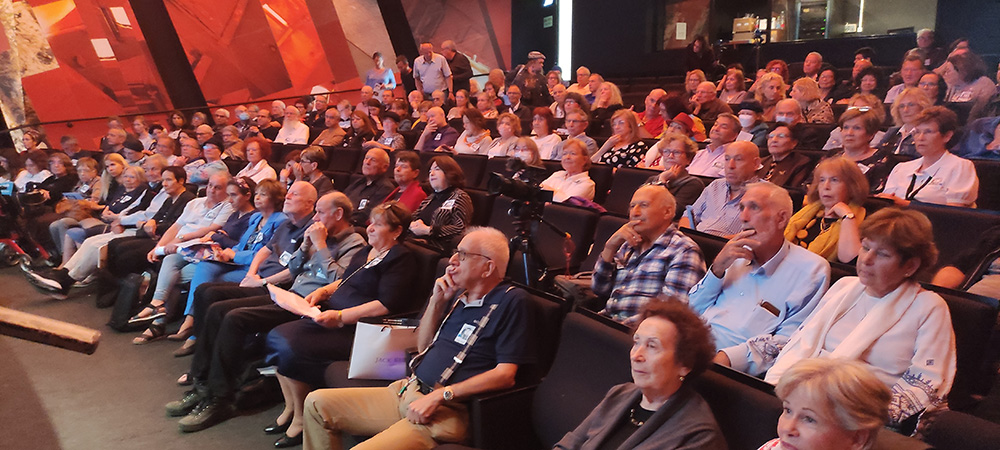
"I quietly vomited all the time. With storms, without storms," admitted Nachum Manor, the ship’s radio operator, in a video shown at the conference.
"Where we worked there was a Morse code key on the table, the transmission device in front of me, and a bucket on the floor. There was a fixed code sign. I would transmit, give the code sign, throw up, and transmit again."
He said that the ship set sail under the trade name 'Trade Winds,' and like the other refugee ships, it received its 'Zionist' name only after it was exposed by the British: "A message came from Israel: 'Your name is Arthur James Balfour' – so immediately, two sailors got off and wrote on the side of the ship 'Arthur James Balfour.' Half an hour later I received another telegram: 'Your name is not James Balfour, your name is Hatikva.' So they went down again, erased and wrote the new name."
"I got a captain's hat and binoculars and started cursing the British in Hungarian"
My late grandfather, Haim Cohen, was also one of the 'Hatikva' ma'apilim, along with his two brothers Mendel and Zvi, who are also no longer with us. The three survived the horrors of the Holocaust in Budapest, along with their parents, and after the Holocaust they joined a pioneering group of the Zionist youth movement Gordonia-Maccabi HaTzair with the goal of immigrating to Israel. In his testimony at Yad Vashem, he told about his days on the ship:
"I volunteered to work. The ship's machines were going all the time, and you had to oil them while moving. There is a special method for this. It was an unpopular position, so they could give it to a 17-year-old boy, and I was very happy. The American volunteers would drink, in the morning or at night, depending on the shift, a good spiced coffee with rum, and I drank it too."
My grandfather's most memorable story from his days on the ship was about the moment when they realized that their fight against the British who were already on board was doomed for failure.
"There came a point when we realized that we would have to negotiate with the British in order to allow the pregnant women, babies born on the ship, and the wounded, to disembark in Haifa. Of course, the captain could not conduct the negotiations, because he was expected to be imprisoned for 15 years or more. Then someone came up with the idea that I would be the 'captain' – that is, the real captain would be my interpreter, and I, barely 17 years old, would be the 'captain.' I got an oversized captain’s hat, huge binoculars, and I started cursing the British in Hungarian. In the end, no negotiations took place, and in Haifa we were taken to British merchant ships, and from there to Cyprus. But we heard the song ‘Hatikvah’ in Haifa, and it warmed our hearts."
The story of the boy who was presented to the British as the captain of the ship is repeated in the testimonies of the refugees. Some remember it as a little boy only 7 or 8 years old. Menachem Liptzer, 84, who came to the conference with his daughters and granddaughter, says that he used to have a picture of himself with the captain's hat.

‘Hatikva' was escorted by the British to the coast on May 17. The next day, a report appeared in Davar about the deportation to Cyprus.
"Big holes were seen in the ship," it said, "the wooden floor above the deck and part of the ship's hull were breached as if after a severe attack. Heads of ma’apilim peeked out of the breaches. Crowds of ma’apilim were also on the decks. The journalists were warned not to talk to them." However, the reporter was able to extract some of the things that were shouted from the ship, and reported that songs of aliyah and songs of the Land of Israel were heard from the ship:
"We had many people in difficult conditions aboard. Those who were weak, sick, or pregnant. We could not, in this state, show strong opposition." One of the immigrants said that two children were born on the ship on the way, one of whom was born right when the British destroyers seized control. Another declared:
"The Jewish people can’t escape fate. Children are also born on wandering ships." Two ma'apilim, it was reported, were seen on board the ship with fresh bandages on their heads, and one of the ma'apilim was holding a Torah scroll wrapped in blankets.
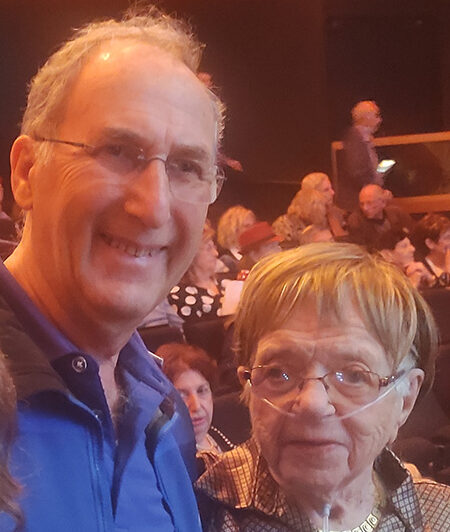
An emotional moment took place at the conference when Moshe Tzur, born in Cyprus to parents who were ma’apilim, spontaneously came up to thank 98-year-old Esther Korzhnik, who nursed him in the detention camp in Cyprus.
"You were like a second mother to me," he said. Korzhnik recounted the days of detention in Cyprus:
"We were taken to detention camp 68, and there we lived in tents, two families in a tent. When I became pregnant, they moved us to a shack. A shack with 12 people. There were no trees there, and it was terribly hot. There was no money, but there was enough food. When my daughter was born, my husband Yossi made her a cart out of tin cans. I remember hearing of the Declaration of the State of Israel in the camp, they danced all night long – what a great joy it was. In January 1949 we were released and went to Israel with the baby."
The conference of the 'Hatikva' sailors and their families was initiated and organized by Leah Bahat, 75, the activity coordinator of the 'Hatikva' ma’apilim at the Cyprus Ma'apilim Association.
"My parents, Tonya and Peretz Dvoretsky, fled to Russia when the war broke out," said Bahat. "They went to Siberia and from there to Uzbekistan. After the war, they split up and returned to Poland. My father went back to look for relatives, and when he couldn't find any, he started trying to immigrate to Israel. My mother, who came from a traditional and Zionist home, returned to Poland with the goal of trying to help Jewish children. They met again in the Rosenheim displaced persons camp on the border of Austria, where they both guided children and youth in the Zionist Youth Union-Akiva movement. From there they continued with the chanichim (youth movement participants) to Italy, and finally boarded ‘Hatikvah,' and together with the chanichim were deported to Cyprus. Our family was among the last to be released from the camps when they closed in February 1949.
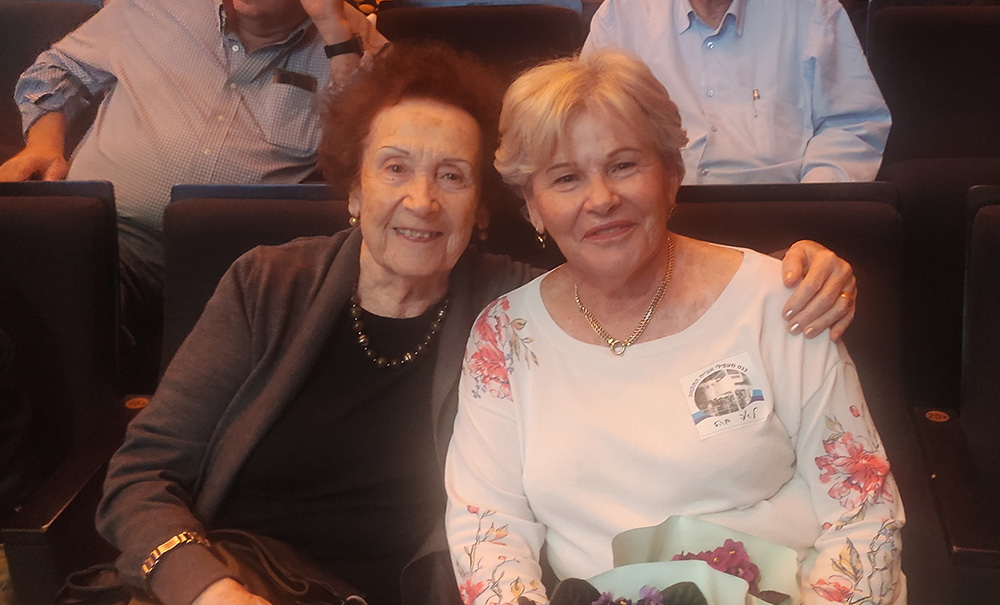
"I was born in Cyprus, in youth camp 65 where my parents were with their chanichim. I was baby number 1,284 out of about 2,200 babies born in the detention camps on the island. The idea was to start collecting information on ‘Hatikvah,' to look for the families of those who immigrated, and eventually to organize the conference. The idea came to me after a trip to Cyprus organized by the association to uncover more of our roots."
The organization of the event required a lot of work, mainly in locating the names of the ma’apilim and establishing contact with their families.
"Since the immigration process was not legal, there were no organized lists of those who immigrated on each ship," said Bahat. "Therefore, out of 1,414 immigrants, we were able to locate the names of only about 120, not all of whom are alive. Before the conference, we were able to contact about 280 immigrants and their families."
According to Bahat, the research work involved digging deep into various archives – including the 'B’Nativi Ha’apalah' archive at Kibbutz Atlit, 'Yad Vashem,' the Zionist archive and more. The Facebook group she founded, ‘Ma'apilei Oniyat Hatikva,’ also helped.
"There is now a resurgence on the subject, and people are looking for details about their parents and grandparents and their immigration stories. For example, I previously looked for the doctor who helped deliver babies on the ship, and just recently his granddaughter contacted the Atlit archive, and that's how we connected. In another case, someone saw that a friend shared a post about her grandmother, who was a nurse on the 'Hatikva' ship, and said: 'My father was also on this ship,' and that's how he came to the conference. I very much hope that following the publication of the article we might get in touch with more families."
Throughout the year, Bahat maintains continuous contact with the oldest remaining ma’apilim, most of whom are over 90 years old, and only some of whom could physically attend the conference.
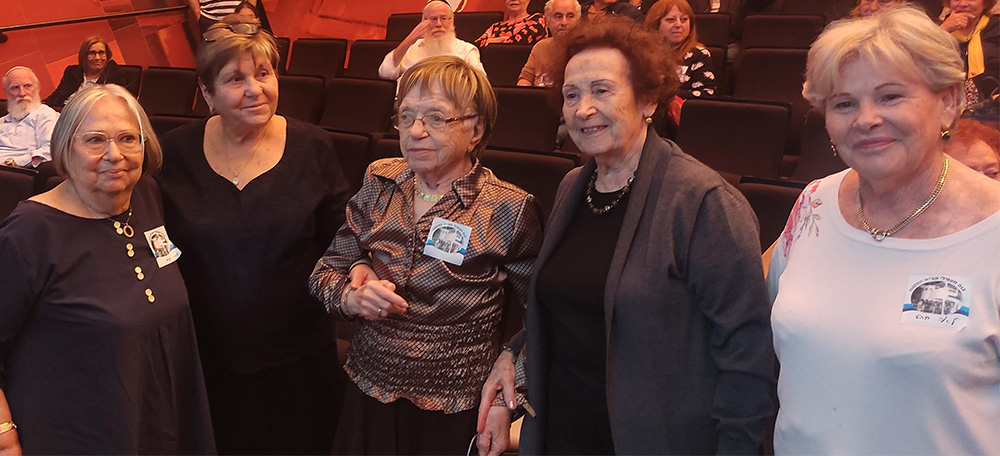
Hannah Weiss, 77, a long-time activist in the association who was herself on the refugee ship 'You Don't Scare Us' at the age of one and a half, and then in a camp in Cyprus, enlisted her help in organizing the event. Weiss compiled the book "Heroic Journey to the Longed-for Land," which contains testimonies of dozens of ma'apilim and children of ma'apilim about their journey and the period of their stay in Cyprus. In recent years she has helped organize several conferences.
"The story of the illegal immigration represents to me the passion for life of the refugees," said Weiss. "I think that these years, from the end of the war until arriving in Israel, are a period that shaped not only my parents' generation. I feel that it shaped me as well, intergenerationally. Therefore, I see it as a mission: to document, to inform and to bring to people this way in which Holocaust survivors built families and founded the State of Israel. Today we know that these people, who in the past were described in the most negative way, gave so much to the country. It would not have been possible without the contribution of the refugees. As someone who raised a family, I understand more the meaning of this, of returning to life."
This article was translated from Hebrew by Etz Greenfeld.






